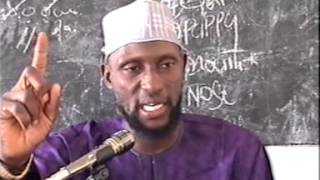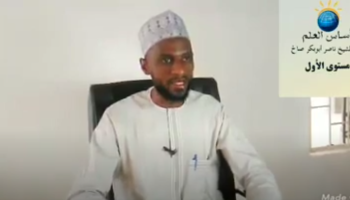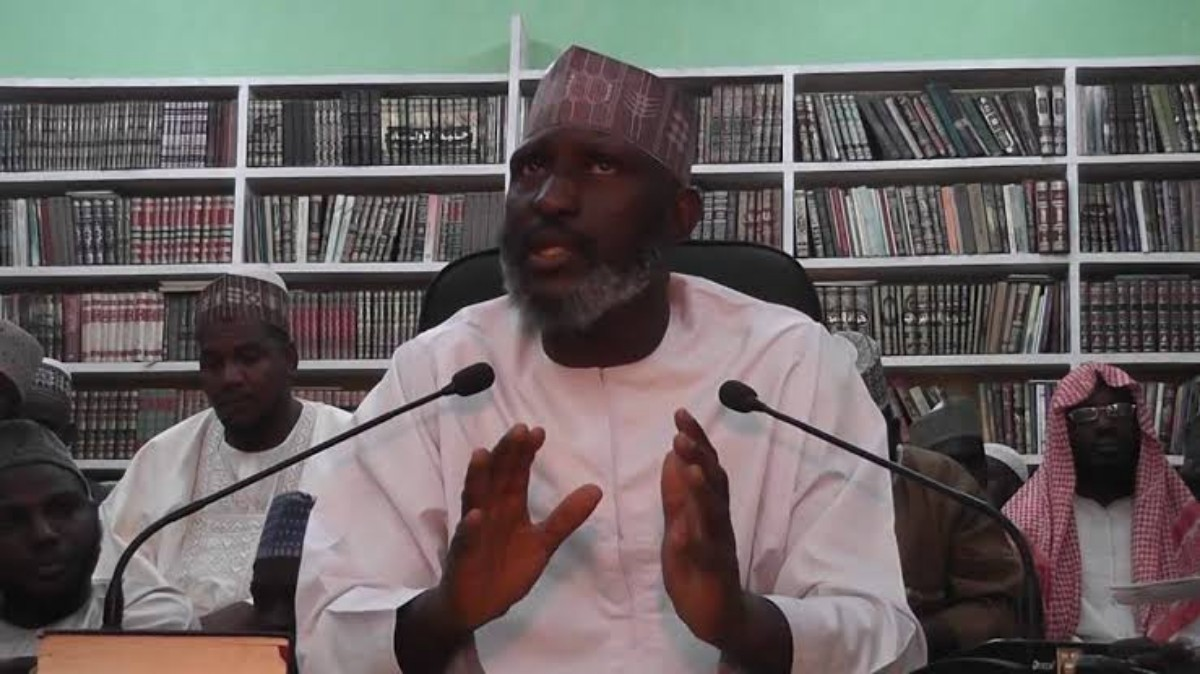Albani Zaria Biography: Life, Family, Teachings, Death, & Legacy
Who was Albani Zaria? This Albani Zaria biography explains all. He is known for his sharp intellect and uncompromising views on Islamic teachings.
Sheikh Muhammad Auwal Albani Zaria was a prominent Nigerian Islamic scholar who significantly impacted the religious landscape in Northern Nigeria.
As a well-known Salafi scholar, Albani Zaria gained popularity for his strong emphasis on the Sunnah (Prophetic tradition) and his call for reform within Islamic practices. Until his tragic assassination in 2014, he remained a central figure in Islamic discourse, using modern tools such as radio and recorded lectures to reach a wide audience.
This biography explores Sheikh Albani Zaria’s life, teachings, legacy, and influence, capturing his role as a controversial yet deeply respected scholar who left an indelible mark on Nigeria’s religious sphere.
SEE ALSO: Stephen Isaboke Biography: Wiki, Age, Life, Wife, Family, & Career

Albani Zaria Biography
Muhammad Auwal Adam, also known as Albani Zaria (27 September 1960 – 1 February 2014) was a distinguished Nigerian Islamic scholar renowned for his expertise in Hadith and Fiqh, Islamic law, mass communication, telecommunications engineering, and ICT. He emerged as a prominent figure in the Salafi movement in Nigeria.
In his earlier life stages, Albani worked as a tailor, often referring to himself as a “specialized tailor.” He was notably the first scholar to associate the term “Salafiyah” with the generation of scholars and students within the Islamic denomination in Nigeria. Many contemporary scholars in Nigeria regard Albani as the foremost Salafi scholar in the country, recognizing his significant contributions to Islamic scholarship.
Early Life and Background
Albani was originally from Kano State in Northern Nigeria but was born and raised in Muchia Sabon Gari, Zaria. He completed his primary education in that area before moving on to Barewa College. He later pursued a degree in mass communication at Bayero University, Kano, and obtained a degree in information technology from the Federal University of Technology Yola in Adamawa State.
Before his passing, he was a postgraduate student in the Department of Electrical Engineering at Ahmadu Bello University (ABU) Zaria. Alongside his formal education, Albani dedicated decades to studying Islamic sciences, particularly Hadith, immersing himself in hundreds of Hadith texts and teaching them extensively. His profound knowledge and authority in Northern Nigeria earned him the nickname “Albani,” in honor of Muhammad Nasiruddin al-Albani.
Albani’s influence as a teacher extended widely, with many of his students becoming respected scholars. They are spread across the country, particularly in the Northern States, including Kaduna, Kano, Katsina, Plateau, Bauchi, and beyond, as well as in several Western African countries.
SEE ALSO: Pankaj Chhaparwal Biography: Wiki, Life, Education, & Cricbuzz Career
Education
Albani’s formal religious education began in his hometown, where he studied under various respected scholars. He was particularly drawn to the sciences of Hadith (the sayings and actions of Prophet Muhammad), and he quickly gained recognition for his mastery in this field. He was fluent in Arabic and had an in-depth understanding of Tafsir (Qur’anic exegesis), Fiqh (Islamic jurisprudence), and Aqeedah (creed).
Unlike many traditional scholars who leaned toward the Sufi heritage common in Northern Nigeria, Albani aligned himself with the Salafi school of thought. This orientation emphasized a return to the practices of the Prophet and his companions, a stance that would become the bedrock of his teachings and public engagements.
He also pursued secular education to some extent, particularly in the areas of technology, which helped him broadcast his message via radio and recorded media. This blend of traditional Islamic knowledge and modern communication skills made him uniquely effective in reaching diverse audiences.
Scholarly Work and Career
Albani Zaria began his career as a teacher of Hadith and Islamic jurisprudence. He taught at various Islamic institutions and was known for being rigorous in his instruction. Students admired his depth of knowledge and his insistence on evidence-based religious practice.
He was the founder and leader of the Islamic School “Markazu As-Salafi” in Zaria. At this institution, he trained numerous students who went on to become preachers and scholars in their own right. His methodology centered on promoting the authentic teachings of the Prophet as documented in Sahih Hadith collections.
Albani utilized media extensively. He became a household name in Northern Nigeria through his radio programs, recorded lectures, and cassette tapes. His lectures often addressed pressing societal issues, bid’ah (religious innovations), and what he considered deviations from the true path of Islam.
His public talks were often straightforward and unyielding, earning him loyal followers and fierce critics.
SEE ALSO: Daniel Ek Biography: Wiki, Age, Life, Spouse, Spotify, & Net Worth

Public Engagement and Preaching
Through radio stations like FRCN Kaduna and other local broadcasters, Albani reached thousands of listeners weekly. He was especially popular among the youth, many of whom resonated with his clear message, modern style of delivery, and his ability to explain complex religious matters in relatable terms.
He was also active in interfaith and intrafaith discussions, where he boldly expressed his views on controversial topics. He would openly challenge practices he believed had no basis in authentic Islamic sources. These included certain Sufi rituals, excessive veneration of saints, and uncritical acceptance of inherited traditions.
Albani’s lectures were not only theological but also moral. He emphasized ethics, personal responsibility, and community development. His public persona combined intellectual authority with moral uprightness, making him both a religious guide and a societal reformer.
Controversies and Opposition
Due to his uncompromising Salafi views, Albani faced significant opposition from scholars and followers of other Islamic traditions, particularly the Tijaniyya and Qadiriyya Sufi orders that dominate Northern Nigeria. He was frequently accused of being divisive, overly critical, and disrespectful to established religious authorities.
He also drew criticism from political and traditional elites for challenging societal norms and speaking out against corruption and misgovernance. His sermons often touched on accountability and the misuse of religious authority, making him a target for both religious and political adversaries.
Despite the controversies, Albani remained resolute. He often stated that his loyalty was to the truth of Islam, not to personalities or institutions. This unwavering stance added to his popularity among those disillusioned with the status quo.
SEE ALSO: Daniel Ek Biography: Wiki, Age, Life, Spouse, Spotify, & Net Worth
Assassination and Death
On Saturday, February 1, 2014, Muhammad Auwal Adam, known as Albani, was teaching at his school in Gaskiya Layout, Zaria. That evening, he delivered his usual tafsir lecture at Markazus-Salafiyya on Maje Road in Tudun Wada, Zaria, from approximately 8:15 to 9:30 p.m., focusing on the Book of Sahih Bukhari, specifically the chapter on Hajj.
After the lecture, he drove himself home, accompanied by one of his wives and some of his children. Preferring to travel alone rather than in a convoy, he stopped to shop at a Central Store along Zaria Gaskiya, about a kilometer from his home. As he approached Magume Junction, assailants overtook his vehicle, smashed the windscreen, and shot his wife. Upon witnessing this, Sheikh Albani confronted the attackers, who began shooting indiscriminately. Muhammad Auwal Albani fell, reciting “Laila ha illallahu.”
Throughout the ordeal, he was heard reciting “Laila ha illallahu. Inna lillahi wa inna ilaihi raji’unn” (“From God we are, and to Him we shall certainly return”). His wife and one son died at the scene, while a nearby resident rushed him to St. Luke Hospital in the Wusasa area of Zaria, where he was pronounced dead. Boko Haram leader Abubakar Shekau later claimed responsibility for the shooting.
Legacy and Influence
Albani Zaria’s legacy is both vast and enduring. He is credited with reviving the study and appreciation of Hadith in Northern Nigeria and bringing Salafi teachings into mainstream Islamic discourse. His recorded lectures continue circulating widely, educating new generations long after his death.
Several institutions and student movements inspired by his work have continued to grow, spreading his ideology of religious purification, intellectual inquiry, and reform. His students, now teachers and preachers in their own right, carry forward his teachings across Nigeria and beyond.
He is also remembered for his efforts to make Islamic education accessible. Through radio, cassettes, and later digital platforms, he democratized access to knowledge and created an informed, questioning audience.
Despite the controversies, even his critics acknowledge his intellectual rigor and his passion for Islam. For many, he represents a voice of courage, conviction, and clarity in an often-politicized religious environment.
SEE ALSO: Disha Salian Biography: Age, Life, Relationship, Family, & Death

Personal Life
Sheikh Albani Zaria was a family man. He was married and had several children. Those close to him describe him as humble, disciplined, and deeply committed to his faith and family. His home was a center of learning, and he balanced his public duties with personal responsibilities.
He avoided ostentation and lived a simple life, reflecting the values he preached. His love matched his dedication to scholarship and da’wah and care for his family, making his death not just a public tragedy but a deeply personal one for many who knew him.
SEE ALSO: Biography of Bibhutibhushan Bandopadhyay: Wiki, Life & Legacy
Conclusion on Albani Zaria Biography
Sheikh Muhammad Auwal Albani Zaria was more than just a preacher—he was a reformer, a teacher, and a voice of clarity in an era of confusion. Through his scholarship, media presence, and unwavering stance on religious authenticity, he transformed how many Nigerians taught and understood Islam.
His assassination marked the loss of a powerful voice in Islamic scholarship, but his teachings continue to inspire. Albani Zaria’s life is a testament to the enduring power of conviction, the importance of knowledge, and the impact of one man’s dedication to his faith.
Though gone, Albani Zaria’s influence lives on—in classrooms, mosques, radio waves, and the hearts of
